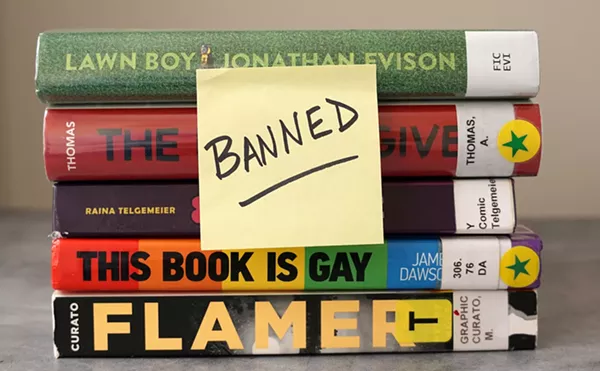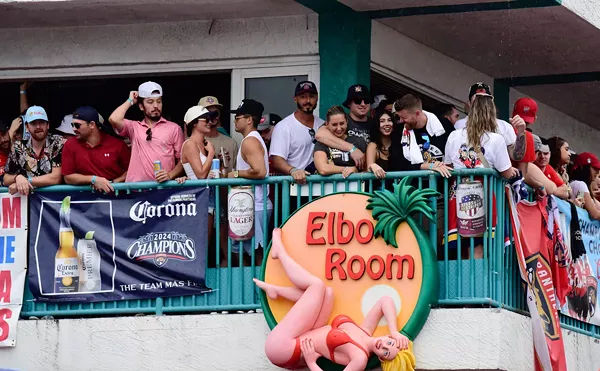National child welfare advocates held a joint presser to speak out against the so-called Indiana-style bill (HB 7111) that's been moving rapidly through the House that would allow private adoption agencies to turn down applications for adoption based solely on the agencies' religious beliefs. This, the opposition says, would allow the agencies to legally specifically turn down gay couples looking to adopt.
The bill has passed through a couple of House committees and will be considered by a Senate committee on Monday afternoon.
As written, the bill offers up a so-called “conscience protection” via “religious or moral convictions," and while it doesn't specifically mention same-sex couples, the wording in it means that agencies could turn down families based on martial status, as well as political orientation, religion, and sexual orientation.
Nadine Smith of Equality Florida says the bill is worse than the Indiana-style bill it's been compared to. "It's worse than what was proposed in Indiana, in part because it’s tax-payer funded," she said. "It puts the for-profit agency’s needs ahead of the children's."
The state previously banned same-sex couples from adopting, but in 2010 a Florida appeals court ruled the ban unconstitutional. Then last month, the GOP-dominated House officially acknowledged that it was unconstitutional, and voted to repeal the ban. But critics of the repeal argued that the lifting of the ban would prompt some adoption agencies to shut their doors rather than comply and allow gay couples to adopt. House Health & Human Services chairman, State Rep. Jason Brodeur, who sponsored HB7111, is one of those critics.
On Friday, the child welfare advocates decried the bill's broadly written wording, saying that it very clearly targets the LGBT community and gives agencies the power to turn down potential adopters.
"The measure allows any child placing agency to deny services to an otherwise qualified individual," said David Barkey, who serves as attorney to the Anti-Defamation League's Southeastern Area. "If you don’t like gay people, or Jewish people or Muslim people, this bill empowers them to deny them. And the tax payer has to foot the bill for these agencies."
Barkey also pointed out that the bill would potentially violate Florida constitution laws, as well as federal law, and federal equal protection laws.
"This is history repeating itself," Barkey added. "If Florida passes this bill, we will be going backwards."
Brodeur said earlier this month that if gay couples want to adopt, they can go to the Department of Children and Families or to a private agency. Broduer has argued that HB7111 would keep many faith-based adoption agencies and churches that organize adoptions from closing their doors and, in essence, start a crisis where children are left without a home.
But Smith and her fellow advocates countered that argument Friday by saying the only criteria for adoption in Florida should be a child’s needs, and have nothing to do with the agency.
"The majority of social workers in the field are begging for more adoptive families," said Maria Bates. "We’re going to have less and less families when we need more families. This affects all foster children looking for a forever family."
The bottom line message from the welfare advocates: should HB7111 pass, it'll leave thousands of foster kids in the lurch.

Audio By Carbonatix
[
{
"name": "GPT - Billboard - Slot Inline - Content - Labeled - No Desktop",
"component": "16971022",
"insertPoint": "2",
"requiredCountToDisplay": "2"
},{
"name": "STN Player - Float - Mobile Only ",
"component": "18617832",
"insertPoint": "2",
"requiredCountToDisplay": "2"
},{
"name": "Editor Picks",
"component": "15769925",
"insertPoint": "4",
"requiredCountToDisplay": "1"
},{
"name": "Inline Links",
"component": "16575154",
"insertPoint": "8th",
"startingPoint": 8,
"requiredCountToDisplay": "7",
"maxInsertions": 25
},{
"name": "GPT - Rectangle 2x - Slot Auto-select - Labeled",
"component": "15782206",
"insertPoint": "8th",
"startingPoint": 8,
"requiredCountToDisplay": "7",
"maxInsertions": 25
},{
"name": "Inline Links",
"component": "16575154",
"insertPoint": "8th",
"startingPoint": 12,
"requiredCountToDisplay": "11",
"maxInsertions": 25
},{
"name": "GPT - Leaderboard to Tower - Slot Auto-select - Labeled",
"component": "15782207",
"insertPoint": "8th",
"startingPoint": 12,
"requiredCountToDisplay": "11",
"maxInsertions": 25
}
]







